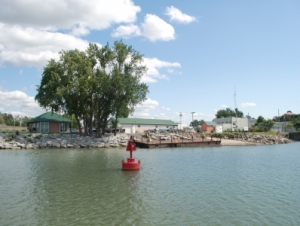

The Great Lakes Center at Buffalo State is offering two new master’s programs in Great Lakes ecosystem science beginning August 2013. Both programs share certain required and elective courses, but they differ in their objectives. The master of science program is designed to prepare its graduates for management positions in the environmental sciences; the master of arts program prepares graduates for research positions or academic careers.
With water from four of the five Great Lakes flowing past the Great Lakes Center Field Station at the mouth of Lake Erie, both programs offer extensive hands-on experience. The field station maintains three large research vessels and a fleet of smaller boats.
The programs respond to demand from both students and employers throughout the Great Lakes ecosystem. “These programs meet a need for people trained to apply scientific data and processes to the questions and concerns related to the Great Lakes,” said Alexander Karatayev, professor and director of the Great Lakes Center.
The interdisciplinary degree will draw on graduate courses already being offered in the biology, chemistry, geography, geology, and planning programs at Buffalo State. “We have a strong, hands-on GIS program in place,” said Kelly Frothingham, program coordinator and associate professor and chair of the Geography and Planning Department. “Students will be able to choose electives that are relevant to their area of specialization.”
The Great Lakes Center will offer specialized seminars, internships, and coursework for students enrolled in the programs. “Throughout the Great Lakes region, we see questions and concerns relating to water quantity and quality, lake diversion, climate change, land use change, brownfield development, and invasive species,” said Karatayev. “Our new programs will prepare students to bring scientific solutions to these issues.”
The master of science program is modeled on the guidelines for professional science master’s (PSM) degrees. PSM programs provide students with business leadership training through courses in communication, economics, and project management. Plans are in the works to apply for official affiliation status with the national PSM agency—the Keck Graduate Institute. Government agencies, environmental consulting groups, and non-governmental agencies have indicated, through surveys and meetings, support for such a program. Eligible students are invited to apply.
“The Great Lakes Center, its research scientists, and its faculty associates have established a reputation for expertise on the issues facing the Great Lakes and on the biology of invasive species,” said Mark Severson, dean of the School of Natural and Social Sciences. “With these new graduate programs, we fill a very important niche in educating students to manage one of the world’s most crucial natural resources.”
Some content on this page is saved in PDF format. To view these files, download Adobe Acrobat Reader free. If you are having trouble reading a document, request an accessible copy of the PDF or Word Document.
